英语的否定句
初中英语否定句用法归纳

初中英语否定句用法归纳-CAL-FENGHAI.-(YICAI)-Company One1初中英语否定句用法归纳一、用一般否定词not,否定了英语中的绝大多数句子。
1、对be动词的否定,在后面加上not。
He is not a student.2、对谓语动词的否定,根据人称和时态在前面加上助动词don’t, doesn’t, didn’t。
He didn’t watch TV last night.3、对助动词的否定,在后面加上not。
He has not been to Shanghai before.5、对need, dare的否定:need和dare除了可以用作情态动词外,还可以用作普通的行为动词,即除了上表中的否定形式外,还有don’t need to和don’t dare to的否定形式。
在实际运用中需注意。
6、对has/have 的否定:have在现在完成时中为助动词,其否定形式在后面加上not,作为“有”的意思,其否定形式也可以在后面加not,即hasn’t和haven’t,但该用法在课本中没有出现。
所以,不管have作为什么意思,只要不是用作助动词构成现在完成时,其否定形式一律用don’t/doesn’t/didn’t have。
7、不定式的否定:在前面加上not。
即:ask / tell /…sb not to do sth。
8、动名词的否定:在前面加上not。
即:worry about not doing。
9、祈使句的否定:在句首加上Don’t。
如有please,在please后面加上don’t。
Please don’t talk in class.二、通过绝对否定词否定。
此类词如下:never, no, no one, nobody, nothing, nowhere, none, neither, neither…nor…, no more, no longer。
☆特别提醒:1、绝对否定词no相当于not…any…。
否定句的构成和转换方式
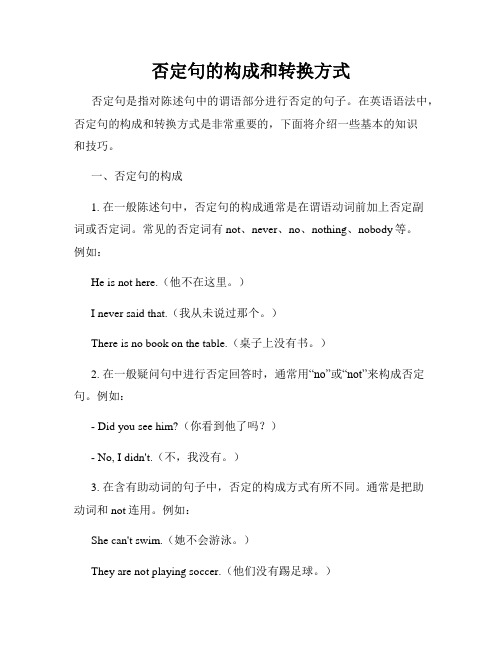
否定句的构成和转换方式否定句是指对陈述句中的谓语部分进行否定的句子。
在英语语法中,否定句的构成和转换方式是非常重要的,下面将介绍一些基本的知识和技巧。
一、否定句的构成1. 在一般陈述句中,否定句的构成通常是在谓语动词前加上否定副词或否定词。
常见的否定词有not、never、no、nothing、nobody等。
例如:He is not here.(他不在这里。
)I never said that.(我从未说过那个。
)There is no book on the table.(桌子上没有书。
)2. 在一般疑问句中进行否定回答时,通常用“no”或“not”来构成否定句。
例如:- Did you see him?(你看到他了吗?)- No, I didn't.(不,我没有。
)3. 在含有助动词的句子中,否定的构成方式有所不同。
通常是把助动词和not连用。
例如:She can't swim.(她不会游泳。
)They are not playing soccer.(他们没有踢足球。
)二、否定句的转换方式1. 直接否定转换直接否定转换是通过在原句中添加或删除否定词来实现的。
例如:I have a car.(我有一辆车。
)→ I don't have a car.(我没有车。
)She always wakes up early.(她总是早起。
)→ She never wakes up early.(她从不早起。
)2. 倒装否定转换倒装否定转换是通过将助动词和主语倒装来实现的。
例如:He has finished his homework.(他完成了作业。
)→ Has he not finished his homework?(他没有完成作业吗?)You should go to bed early.(你应该早点睡觉。
)→ Shouldn't you go to bed early?(你不应该早点睡觉吗?)3. 去除助动词与情态动词的否定转换当否定句中含有助动词或情态动词时,可以通过去除该助动词或情态动词的方式来实现转换。
英语改为否定句的口诀
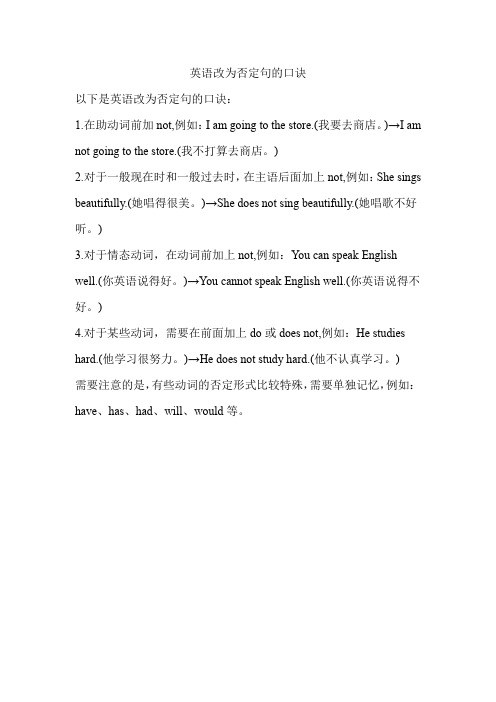
英语改为否定句的口诀
以下是英语改为否定句的口诀:
1.在助动词前加not,例如:I am going to the store.(我要去商店。
)→I am not going to the store.(我不打算去商店。
)
2.对于一般现在时和一般过去时,在主语后面加上not,例如:She sings beautifully.(她唱得很美。
)→She does not sing beautifully.(她唱歌不好听。
)
3.对于情态动词,在动词前加上not,例如:You can speak English well.(你英语说得好。
)→You cannot speak English well.(你英语说得不好。
)
4.对于某些动词,需要在前面加上do或does not,例如:He studies hard.(他学习很努力。
)→He does not study hard.(他不认真学习。
)
需要注意的是,有些动词的否定形式比较特殊,需要单独记忆,例如:have、has、had、will、would等。
小学英语否定句

44.They are going to the cinema this evening. They aren’t / are not going to the cinema this evening.
11.Lingling can speak good English. Lingling can’t / can not speak good English.
12.The students can play football after school. The students can’t / can not play football after school.
40.Sarah can do Chinese Kung fu. Sarah can’t / can not do Chinese Kung fu.
41.My coat is pretty. My coat isn’t / is not pretty.
42.This is a good film. This isn’t / is not a good film.
25.Amy and I have some nice pictures. Amy and I don’t / do not have some nice pictures.
26.I like painting. I don’t / do not like painting.
27.I go to school on foot. I don’t / do not go to school on foot.
英语否定句
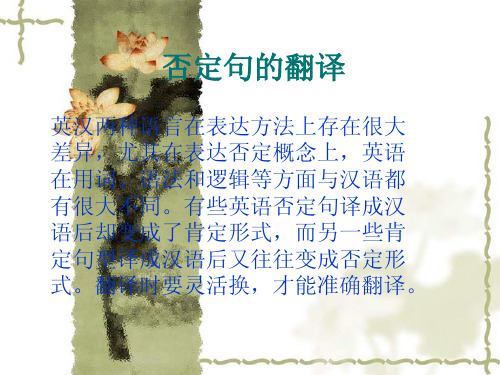
(7)否定词+否定意义的动词/名词/形容词/副词 英语中有许多词语虽没有被否定词修饰或不 含否定词缀,但它们的意义却完全可能是否定的, 这样的词和否定词连用时也会构成双重否定。 We don't doubt that he will succeed in carrying out the experiment. 我们相信他会做好这个实验。 There is no denying the fact that your action has affected her normal life. 不可否认,你的行为已经影响了她的正常生活。 Comrade Lei Feng was not reluctant to help others. 雷锋同志非常乐于助人。
否定句的翻译
英汉两种语言在表达方法上存在很大 差异,尤其在表达否定概念上,英语 在用词、语法和逻辑等方面与汉语都 有很大不同。有些英语否定句译成汉 语后却变成了肯定形式,而另一些肯 定句型译成汉语后又往往变成否定形 式。翻译时要灵活换,才能准确翻译。
部分否定
表示方法: 一、 all 的否定式:not all…(或:all…not)表示\"并非 都……\"、\"不是所有的都……\masters. (= All men cannot be masters.) 并非人人都能当头头。 Not all bamboo grows tall. 并非所有的竹子都会长很高。
(2)主语否定+状语否定
主语否定指主语常由no-word(比如no+名词、nobody、 none nothing、no one等,这些词被称之为绝对否定词)来担当, 或主语由not来否定。 In some countries no major business is carried on without eye contact, requiring face-to-face conversation. 在有些国家,一切公事都要面对面地进行,需要当面交谈。 There is no success without hard ships.
100个否定句英语

以下是100个否定句的英语句子,希望能对您的学习有所帮助:I don't like coffee.He isn't happy.They aren't coming to the party.She doesn't speak Mandarin.We aren't going to the movies tonight.He doesn't play basketball.She isn't studying French.They don't eat meat.I'm not feeling well.He doesn't like spicy food.She isn't a doctor.They aren't in the same class.We aren't tired yet.He doesn't work on weekends.She isn't married.They don't live in this city.I'm not interested in politics.He doesn't watch horror movies.She isn't a fan of rock music.They don't like to travel by plane.We aren't going to the beach tomorrow.He isn't a good cook.She doesn't own a car.They aren't wearing warm clothes.I don't have any siblings.He isn't a morning person.She isn't a good dancer.They don't study together.We aren't going to the concert tonight.He doesn't have any pets.She isn't a fast runner.They don't speak Spanish fluently.I'm not a fan of spicy food.He doesn't wear glasses.She isn't very tall.They don't like to go out at night.We aren't going to the gym today.He isn't a good singer.She doesn't have any tattoos.They aren't planning a trip to Europe.I don't want to go to the party.He isn't a fan of social media.They don't like to watch TV.We aren't going to eat at that restaurant.He doesn't play video games.She isn't a vegetarian.They don't enjoy hiking.I'm not in the mood for jokes.He isn't interested in history.She isn't very organized.They don't have any children.We aren't going to play tennis tomorrow.He doesn't like to shop.She isn't good at math.They don't like chocolate.I don't have a lot of free time.He isn't a good driver.She isn't a fan of horror movies.They don't enjoy going to the beach.We aren't going to the park today.He doesn't like to cook at home.She isn't very outgoing.They don't listen to classical music.I'm not very good at sports.He isn't a fan of reality TV.She isn't a good public speaker.They don't like spicy food.We aren't going to the museum this weekend. He isn't a fan of pop music.She isn't a morning person.They don't like to go out to eat.I'm not a fan of action movies.He isn't very artistic.She isn't very talkative.They don't like to dance.We aren't going to the park tomorrow.He doesn't enjoy going to the gym.She isn't a fan of rap music.They don't like to stay up late.I don't like to drive in traffic.He isn't good at fixing things.She isn't interested in politics.They don't enjoy going to the movies.We aren't going to the mall today.He doesn't like to swim.They don't like to travel by train.I'm not a fan of the cold weather.He isn't very adventurous.She isn't very patient.They don't like to go to the zoo.We aren't going to the aquarium next week. He doesn't like to go to the doctor.She isn't a fan of heavy metal music.They don't like to go to the club.I'm not very good at playing instruments. He isn't a fan of romantic movies.She isn't very artistic.They don't like to watch sports on TV.。
10个否定句英语
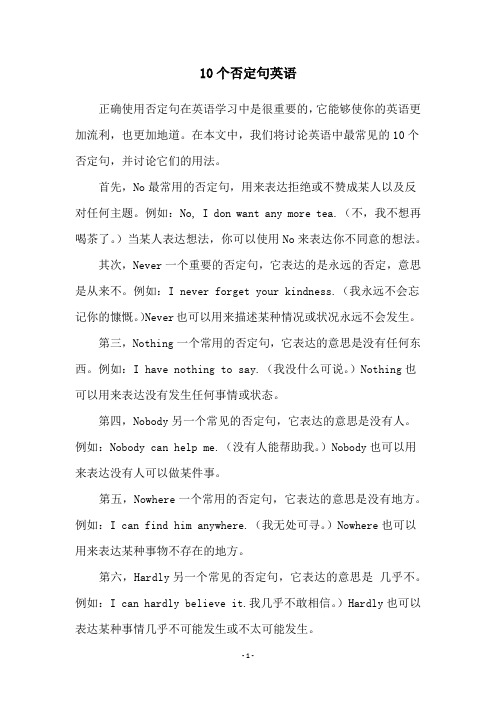
10个否定句英语正确使用否定句在英语学习中是很重要的,它能够使你的英语更加流利,也更加地道。
在本文中,我们将讨论英语中最常见的10个否定句,并讨论它们的用法。
首先,No最常用的否定句,用来表达拒绝或不赞成某人以及反对任何主题。
例如:No, I don want any more tea.(不,我不想再喝茶了。
)当某人表达想法,你可以使用No来表达你不同意的想法。
其次,Never一个重要的否定句,它表达的是永远的否定,意思是从来不。
例如:I never forget your kindness.(我永远不会忘记你的慷慨。
)Never也可以用来描述某种情况或状况永远不会发生。
第三,Nothing一个常用的否定句,它表达的意思是没有任何东西。
例如:I have nothing to say.(我没什么可说。
)Nothing也可以用来表达没有发生任何事情或状态。
第四,Nobody另一个常见的否定句,它表达的意思是没有人。
例如:Nobody can help me.(没有人能帮助我。
)Nobody也可以用来表达没有人可以做某件事。
第五,Nowhere一个常用的否定句,它表达的意思是没有地方。
例如:I can find him anywhere.(我无处可寻。
)Nowhere也可以用来表达某种事物不存在的地方。
第六,Hardly另一个常见的否定句,它表达的意思是几乎不。
例如:I can hardly believe it.我几乎不敢相信。
)Hardly也可以表达某种事情几乎不可能发生或不太可能发生。
第七,Nothing but一个常见的否定句,它表达的意思是除了其他一切,只有一件事发生。
例如:She has nothing but good intentions.(她只有善意的想法。
)Nothing but也可以用来表达仅有一件事情或一种情感发生。
第八,At no time另一个常见的否定句,它表达的意思是某件事永远不会发生。
英语否定句的基本类型
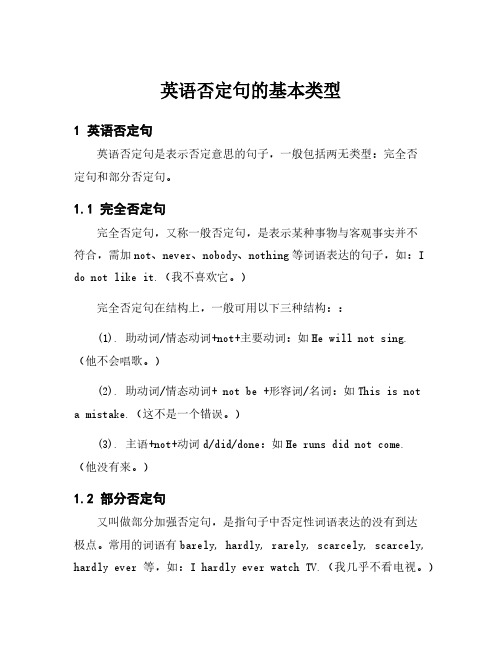
英语否定句的基本类型1 英语否定句英语否定句是表示否定意思的句子,一般包括两无类型:完全否定句和部分否定句。
1.1 完全否定句完全否定句,又称一般否定句,是表示某种事物与客观事实并不符合,需加not、never、nobody、nothing等词语表达的句子,如:I do not like it.(我不喜欢它。
)完全否定句在结构上,一般可用以下三种结构::(1). 助动词/情态动词+not+主要动词:如He will not sing.(他不会唱歌。
)(2). 助动词/情态动词+ not be +形容词/名词:如This is nota mistake.(这不是一个错误。
)(3). 主语+not+动词d/did/done:如He runs did not come.(他没有来。
)1.2 部分否定句又叫做部分加强否定句,是指句子中否定性词语表达的没有到达极点。
常用的词语有barely, hardly, rarely, scarcely, scarcely, hardly ever等,如:I hardly ever watch TV.(我几乎不看电视。
)部分否定句在结构上,也有三种:(1). 助动词/情态动词+hardly / scarcely/ rarely(almost不常用)+动词原形:如He can hardly speak English.(他几乎不会说英语。
)(2). 主语+hardly/scarcely/rarely(almost不常用)+动词过去式:如She rarely visited the park.(她很少去公园。
)(3). 主语+have/has+hardly/scarcely/rarely(almost不常用)+过去分词:如I have hardly taken the exam.(我几乎没参加过考试。
)以上就是英语中完全否定句和部分否定句的基本类型,当然还有很多否定句的表达方式,都是因人而异。
- 1、下载文档前请自行甄别文档内容的完整性,平台不提供额外的编辑、内容补充、找答案等附加服务。
- 2、"仅部分预览"的文档,不可在线预览部分如存在完整性等问题,可反馈申请退款(可完整预览的文档不适用该条件!)。
- 3、如文档侵犯您的权益,请联系客服反馈,我们会尽快为您处理(人工客服工作时间:9:00-18:30)。
肯定句变否定句1.简单句中含有系动词be、情态动词和助动词时,变否定句时需在系动词be、情态动词和助动词后加not。
如:I am a teacher.→I am not a teacher.He can help me.→He can't help me.2.简单句中谓语动词为行为动词时,要根据时态选用do的相应形式,把肯定句变为否定句。
如:The little girl wants to go there.→The little girl doesn't want to go there.He did his work yesterday.→He didn't do his work yesterday.3.祈使句变否定句时,一般在句首加Don't,但Let us或Let's开头的祈使句在Let us或Let's 后加not即可。
如:Put them over there.→Don't put them over there.Let us go home.→Let us not go home.4.主从复合句中,主句是I think,I believe等结构,变否定句时,形式上否定主句,实际上否定从句。
如:I don't think chickens can swim .我认为鸡不会游泳。
5.“had better +动词原形”,变否定句时为“had better not +动词原形”。
如:You'd better go to school.→You'd better not go to school.6.动词不定式变否定式时,常在不定式to前加not。
如:The teacher tells me to do it.→The teacher tells me not to do it.7.使役动词和感官动词(make,let,hear,see,watch等)后接省略to的不定式,此种不定式变否定句时只需在省略to的动词原形前加not。
如:I saw her work.→I saw her not work.8.特殊形式的否定句,有以下几种:(1)肯定句含有every-的合成词时,变否定句时改为no-。
如:Everything is ready.→Nothing is ready.(2)肯定句中含有always,usually和ever时,变否定句时改为never。
如:He is always late for school.→He is never late for school.(3)肯定句含有many,much时,变否定句时分别改为few,little。
如:Many students know him.→Few students know him.(4)肯定句中含有still时,变否定句时应改为no longer。
如:Tom is still in bed.→Tom is no longer in bed.(5)肯定句含有both,both...and,all时,变否定句时应改为never,neither...nor,none。
如:Both of us are students.→Neither of us is a student.(6)肯定句含有nearly,almost时,变否定句时应改为hardly。
如:Lily nearly knows him .→Lily hardly knows him .(7)肯定句含有“形容词+enough”时,变为否定句时应改为“too +形容词的反义词”。
如:He is short enough to reachit.He is too tall to reach it.(1)谓语动词是be,have(有)或谓语含有助动词、情态动词时,直接在这些词后加上否定词not。
如:She can swim.She can't swim.(2)谓语动词是行为动词时,要在该动词前加上do /does /did not,该词恢复原形。
如:He gets up early.He doesn't get up early.(3)既要否定谓语动词,又要变换句中的单词。
如:He can read and write.He can't read or write.(4)用含否定意义的词或词组取代肯定句中的某些词或词组。
如:I know both English and Chi- nese.I know neither English nor Chinese.类似的有:ever /always never,somebody nobody,something nothing,everybody no one,almost hardly2.祈使句的肯定式变否定式(1)一般在动词前加上don't。
如:Open the window .Don't open the window.(2)含有“Let's...”的祈使句,一般用“Let'snot...”的形式,美国人偶尔也用“Don'tlet's...”这一形式。
加强语气时使用“Let'sdon't...”这一形式。
如:Let's go there.Let's not go there.3.复合句的肯定式变否定式一般将主句变为否定式。
如:I saw her when I left .I didn't see her when I left.肯定句改为否定句的基本方法把肯定的陈述句改为否定句的基本方法首先要掌握否定句构成的基本规则。
①当陈述句的谓语动词由be构成时,改为否定句,把not加在be后面。
例1.They are doctors.这个句子的谓语动词是由系动词构成的,改为否定句时把not加在are的后面,即:They are not doctors.例2.He is g oing to see his friend tomorrow.本句的谓语由is going to see构成,改为否定句时把否定词not加在is后面,即:He is not going to see his friend tomorrow.②当陈述句的谓语由情态动词can(may,must等)+其他动词构成,或由助动词will,have,had等十其他动词构成时,改为否定句,用情态动词或助动词十not+动词的形式表示。
例3.They will go to see their parents this afternoon.这个句子谓语由助动词will加动词g o构成,改为否定句时,把not放在will后面,即:They will not(won't)go to see their parents this afternoon.例4.The train had already left when we got to the station.这个句子谓语由助动词had加leave的过去分词left构成,改为否定句时要把not加在had 后面,同时already改为yet,即:The train had not left yet when we got to the station.例5.Linda can speak Chinese well.本句的谓语由can+speak构成,把它改为否定句时,在can后面加not,即:Linda can not speak Chinese well.例6.We have already learned English for two years.本句的谓语由have+learned构成,把它改为否定句时,要在助动词have后面加not,把句中的already改为yet,即:We have not learned English for two years yet.③当陈述句的谓语动词是have,表示有什么,改为否定句的方法是:(A)由have+not+其他;(B)由have十no十其他;(C)由don't(doesn't,didn't)+have十其他,如果句中有some,要将some改为any。
例7.You have some books.这个句子谓语动词have当“有”讲,在改为否定句时要把not放在have后,并把some改为any,即:You have not any books.这个句子也可以改写为在have后加no即:You have no books.这个句子还可以改写为:You don't have any books.④当陈述句的谓语由have十其他词构成,这时have不当“有”讲,也不是“助动词”,改为否定句时,由助动词do(does,did)+not+have构成否定结构。
例8.They often have breakfast at seven in the morning.本句的谓语动词是have,而have+breakfast的意思是“吃早饭”,把它改为否定句,要由助动词do+not+have breakfast构成否定形式,即:They don't have breakfast at seven in the morning.例9.He had a meeting yesterday afternoon.本句谓语动词had+meeting的意思是“开会”,是一般过去时,改为否定句时由did not+have a meeting构成否定形式,即:He didn't have a meeting yesterday afternoon.●以上两个例句说明改成否定句时,千万不要盲目把否定词加在have(has,had)后面。
如果是由has或had +其他词构成的谓语改为否定句时,加上(does,did)not后要注意把has,had改为原形have。
⑤陈述句的谓语动词是行为动词,改为否定句时,要用助动词do(does,did)+not+行为动词构成否定形式。
例10.He studies English well.本句的谓语由行为动词studies构成,把它改为否定句时要由助动词does+not构成否定形式,即:He doesn't study English well.例11.Her brother went to London in 1998.本句的谓语由行为动词g o的过去式went构成,改为否定句时,由助动词did+not构成否定形式,即:Her brother didn't go to London in 1998.例12.Betty often does her homework after supper.这个句子的谓语由行为动词does构成,要把它改为否定句,须用助动词does+not并把其放在主语之后,同时把原句中的does改为原形即:Betty doesn't often do her homework after supper.例13.He did it by himself.本句的谓语由did构成,把它改为否定句要由助动词did +not构成否定式,并放在主语后面,同时要把原句中的did改为do,即:He didn't do it by himself.●要注意加上does not或did not改为否定句以后,要把原句的动词改为原形动词,特别是行为动词do的第三人称单数does和过去时did,在主语后面加上doesn't或didn't以后,千万要注意把句中的does或did改为do。
